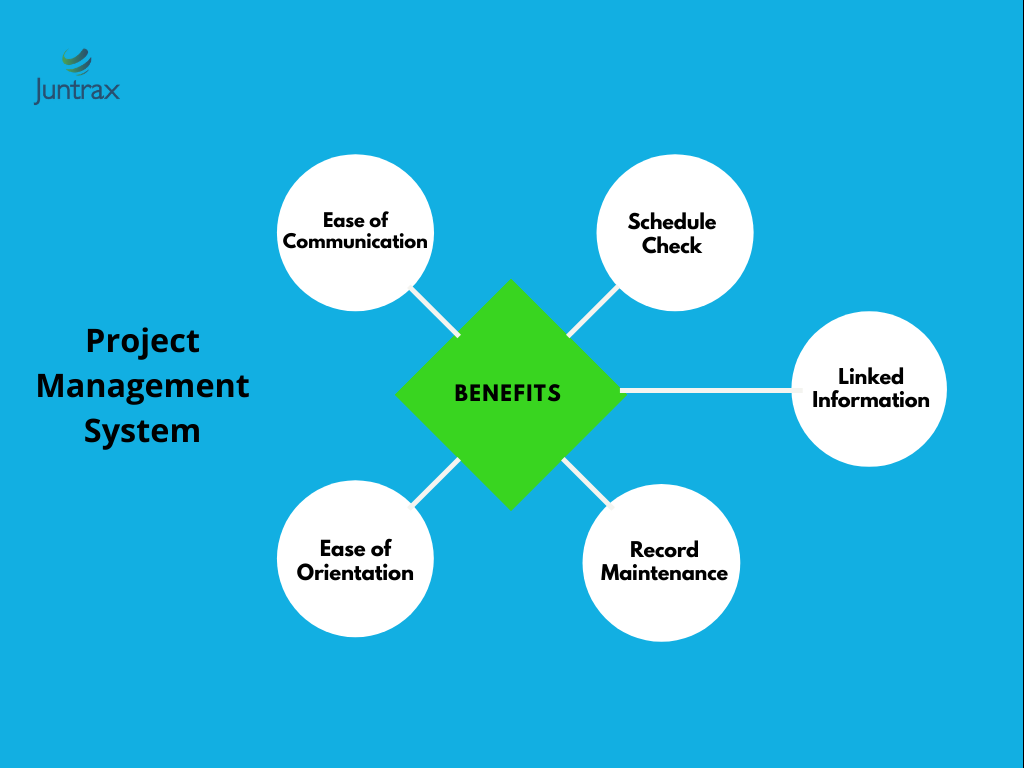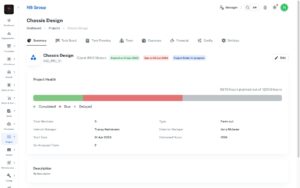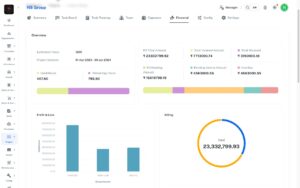Benefits of using Project Management System in Startups & SME

Every startup and Small and Medium-sized Enterprise (SME) dreams of scaling efficiently and effectively.
But juggling multiple projects, deadlines, and team activities without a proper system can feel like herding cats.
Sounds daunting, right? That’s where a project management system comes to the rescue.
A project management system helps businesses keep track of their tasks, streamline operations, and maintain clear communication channels within the team.
Whether you’re managing deadlines, overseeing resource allocation, or simply trying to keep everyone on the same page, a robust project management tool can be a game-changer.
In this article, we’ll explore the top benefits of using a project management system in startups and SMEs. Such systems can foster collaboration, improve productivity, and ultimately drive business success.
What is a Project Management System?

A Project Management System (PMS) is a suite of tools designed to help teams efficiently plan, execute, and monitor projects.
Think of it like a digital cockpit where you can track progress, manage tasks, and collaborate seamlessly with your team.
Unlike traditional methods that often involve endless email threads and scattered documents, a PMS centralizes all project-related information, making it easily accessible to everyone involved.
With features like task assignments, deadline tracking, resource allocation, and real-time updates, a Project Management System ensures that nothing falls through the cracks.
Benefits of Project Management Systems in Startups & SMEs

In the hustle and bustle of a startup, it’s tempting to overlook project management. Time is precious, and there never seems to be enough of it. However, investing in project management from the beginning is key to maintaining a smooth and efficient operation.
Project management provides startups with clear direction and structure—a roadmap that guides them through their journey, highlighting potential twists, turns, and obstacles. This is especially vital as startups grow and tackle larger projects.
And that’s just the beginning.
Improved Team Effectiveness
Imagine a workspace where every team member knows their tasks, deadlines, and priorities without the constant need for follow-ups and clarifications.
A Project Management System (PMS) brings this vision to life by streamlining communication and task allocation. It allows team members to see the big picture as well as their individual contributions, ensuring everyone’s efforts are aligned and no one is left in the dark.
This enhanced team effectiveness is invaluable for startups and SMEs, where resources are often limited and every second counts.
A PMS facilitates real-time collaboration, reduces bottlenecks, and keeps the momentum going.
By providing a clear structure and accountability, it empowers your team to focus on what truly matters—delivering high-quality work on time and within budget.
Pro Tip:
“To maximize team effectiveness, regularly utilize the built-in dashboards and reporting features of your PMS. These tools provide a real-time overview of project status and team performance, allowing you to make data-driven decisions and quickly address any bottlenecks or misalignments.”
Improved Project Success Rates
A PMS ensures clarity and focus by systematically breaking down projects into manageable tasks and milestones, reducing the likelihood of missed deadlines and overlooked steps.
A 2021 PMI survey found that organizations with mature project management practices waste 28x less money than those with poor practices. Startups that use project management software have a 75% success rate compared to 56% for those that don’t.
Moreover, the analytical tools within a PMS provide actionable insights into performance metrics, helping you identify what works and what doesn’t in real-time.
This continuous feedback loop enables proactive adjustments and strategic pivots, thereby boosting the chances of project success.
Pro Tip:
“Integrate your PMS with performance tracking tools like KPI dashboards to monitor key metrics continuously. Schedule regular ‘retrospective’ meetings to review these metrics, celebrate successes, and identify areas for improvement. This continuous feedback loop is crucial for maintaining high project success rates.”
Well-Defined Communication Plan
Effective communication is the lifeblood of any successful project, especially in dynamic environments like startups and SMEs.
A Project Management System (PMS) lays the groundwork for a well-defined communication plan by centralizing all discussions, updates, and feedback in one place.
Gone are the days of sifting through countless emails or trying to remember what was discussed in last week’s meeting. With a PMS, every conversation is documented and easily accessible, ensuring no crucial detail gets overlooked.
This streamlined communication saves time and fosters transparency and accountability among team members.
Pro Tip:
“Encourage the use of the PMS’s communication features by setting specific guidelines on how and when to use them. For example, use discussion boards for project-related conversations and direct messages for one-on-one communication. This helps keep everything organized and easily accessible.”
Clearly Defined Roles Eliminate Confusion
Role ambiguity can lead to missed deadlines, duplicated efforts, and sheer frustration.
A Project Management System (PMS) eliminates this confusion by clearly defining roles and responsibilities from the get-go. Each team member knows exactly what is expected of them, which tasks they need to tackle, and who to turn to for support or collaboration.
This clarity creates a more focused and efficient workflow, ensuring that every piece of the project puzzle fits seamlessly into place.
By delineating roles within the PMS, you create a structured environment where everyone can track their progress and understand how their work contributes to the larger goals.
This not only boosts individual productivity but also enhances team morale by reducing overlaps and conflicts.
Pro Tip:
“Regularly update and review role assignments in the PMS to ensure they reflect the current project needs. Conduct brief ‘role clarity’ sessions at the start of each major project phase to re-affirm responsibilities and ensure everyone understands their part in achieving the project goals.”
Effortless Project Planning
Planning a project can often feel like putting together a complex puzzle, especially in the fast-paced world of startups and SMEs.
A Project Management System (PMS) takes the guesswork out of this process by providing intuitive tools for setting timelines, allocating resources, and breaking down tasks into manageable chunks.
With just a few clicks, you can map out an entire project lifecycle, setting your team up for success right from the start.
This streamlined planning process not only saves valuable time but also ensures that no detail is overlooked. Using a PMS, everyone involved can visualize the project roadmap, identify potential bottlenecks, and make data-driven decisions to keep things on track.
Pro Tip:
“Utilize the template and automation features in your PMS to expedite project planning. Create standardized project templates for recurring types of projects, which can be customized as needed. This not only saves time but also ensures consistency and thoroughness in your planning process.”
Tracking Project Progress

Keeping tabs on project progress can feel like herding cats, especially when juggling multiple priorities and tight deadlines.
A Project Management System (PMS) simplifies this chaos by offering real-time tracking and comprehensive dashboards.
You can easily monitor task completion, milestones, and key performance indicators all in one place. This visibility allows for timely interventions and keeps the project’s trajectory aligned with your goals.
For startups and SMEs, this level of insight is a game-changer. Real-time updates and clear visualizations help the team stay proactive rather than reactive, addressing issues before they escalate.
Tracking project progress through a PMS keeps everyone informed and accountable, leading to smoother workflows and more successful project outcomes. It ensures that you’re not just moving forward but in the right direction.
Pro Tip:
“Set up automated alerts and notifications for key milestones and task deadlines within your PMS. This keeps everyone on their toes and helps quickly address any delays or issues. Regularly review these alerts during team meetings to ensure alignment and accountability.”
Resource Management & Allocation
A Project Management System (PMS) brings precision to resource management and allocation, ensuring that each team member, tool, and budget is optimally utilized.
A PMS helps you allocate the right people to the right tasks at the right time by providing a clear overview of resource availability and requirements.
This meticulous resource management maximizes productivity and prevents burnout and resource clashes.
The PMS allows you to forecast needs and adjust allocations dynamically, keeping the project agile and responsive to changing demands.
Effective resource management through a PMS ensures that your startup or SME can achieve more with less, driving sustainable growth and delivering projects on time and within budget.
Pro Tip:
“Regularly update the resource calendar in your PMS to reflect current and upcoming availability. Use the resource allocation reports to identify any underutilized or overburdened team members and adjust assignments accordingly. This dynamic approach ensures balanced workloads and optimal resource use.”
Stay on Budget and Schedule

Staying on budget and schedule is crucial for sustainability and growth for startups and SMEs.
A Project Management System (PMS) provides the tools to meticulously plan and track financials and timelines, eliminating guesswork. Real-time budget monitoring and timeline tracking allow you to make adjustments on the fly, ensuring that costs are controlled and deadlines are met with precision.
This proactive approach means your projects are less likely to encounter financial overruns or delays, allowing for more predictable outcomes and better resource planning.
By staying on budget and schedule, you build trust with stakeholders and clients, reinforcing your reputation for reliability and professionalism.
Pro Tip:
“Integrate your PMS with financial tracking tools to automatically sync budget and expenditure data. Regularly review financial reports and Gantt charts to ensure you are meeting budgetary and timeline targets. Use this data to make informed decisions and adjustments proactively.”
More Control Over Projects
In the dynamic landscape of startups and SMEs, maintaining control over projects can often feel like steering a ship through stormy seas.
A Project Management System (PMS) offers complete control by centralizing all project-related information into one cohesive platform. With features like task assignment, deadline tracking, and progress reports, a PMS gives you the reins to steer your projects with confidence and efficiency.
Having more control enables you to spot issues early, make informed decisions swiftly, and adjust strategies as needed. This heightened oversight not only keeps your projects on track but also fosters a more disciplined and responsive team.
By leveraging the comprehensive control offered by a PMS, your startup or SME can navigate challenges smoothly and ensure that every project is on course for success.
Pro Tip:
“Utilize the custom reporting features in your PMS to create dashboards tailored to your specific needs. Regularly review these dashboards to monitor key performance indicators (KPIs) and project health metrics. This real-time oversight allows you to take corrective actions immediately if any aspect of the project deviates from the plan.”
Faster Time-to-Market
A Project Management System (PMS) accelerates your time-to-market by streamlining workflows, optimizing resource allocation, and ensuring seamless collaboration. By breaking down projects into clear, actionable tasks and setting realistic deadlines, a PMS keeps everyone aligned and focused on delivering results promptly.
Project management practices help startups bring products to market 28% faster on average. SMEs that use project management software launch products 2.5x faster than those that don’t.
Furthermore, real-time tracking and instant updates facilitate quick decision-making and problem-solving, minimizing delays and bottlenecks.
This enhanced efficiency allows your team to respond swiftly to market demands and opportunities, reducing the time from concept to launch.
Pro Tip:
“Implement agile methodologies within your PMS to promote iterative development and frequent releases. Use sprint planning features to break down the project into smaller, manageable chunks and conduct regular sprint reviews to assess progress and quickly address any issues. This approach aligns the team towards rapid and continuous delivery.”
FAQs
Q1. Does a small business need project management software?
A. Absolutely. The size of your business doesn’t cancel out the advantages of effective project planning and resource management. In fact, it’s even more crucial for small businesses operating with limited budgets and narrow profit margins.
Q2. Can project management software be used for small projects?
A. Definitely! No project is too large or too small for the right project management software. Any project with a series of smaller tasks can benefit from using a project management tool. With capabilities to manage resources, track dependencies, and organize contextual documentation, your team can efficiently tackle projects of any size.
Q3. Which is the best project management software for small teams?
A. There’s no one-size-fits-all solution for the best project management software for small teams; it really depends on the specific features you require. However, Juntrax Solutions is widely regarded as an excellent agile project management tool for small teams.
3 thoughts on “Benefits of using Project Management System in Startups & SME”
Comments are closed.